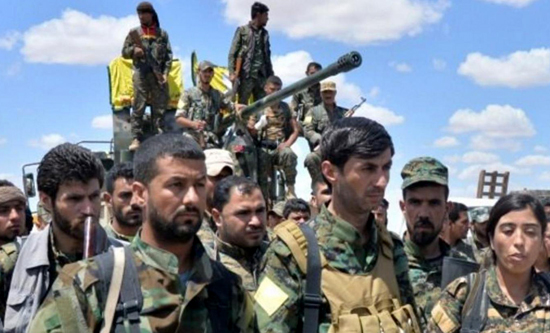
On 24 May 2016 the Syrian Democratic Forces (SDF), began to advance on Raqqa, the Islamic State (IS) headquarters. The SDF comprises 31 forces, including Kurds, Arabs and other ethnic and religious groups, but its largest components are the predominantly Kurdish People’s Protection Units (YPG) and Women’s Protection Units (YPJ) of Rojava (Northern Syria/West Kurdistan). Their advance is receiving Coalition, predominantly US, air support. At the time of writing these forces have liberated towns and villages between Raqqa and the YPG/YPJ-run town of Ain Isa, and have encouraged and welcomed refugees fleeing IS.
While the YPG/YPJ in Rojava, gain victories against ISIS, Turkish troops have crossed the border into Qamishlo, Rojava, digging trenches 50 metres into Rojava territory. This is in addition to the repeated cross-border shelling of Rojava by Turkey and the killing of Kurdish civilians along the border. The Turkish state has said it will not allow the YPG/YPJ to take over the entire border between Syria and Turkey. This border has been used as a route for supplies between Turkey and IS and other jihadist forces in Syria.
Despite the Kurdish involvement in the fight against IS and obvious stake in the outcome of the war, they have been denied representation in the Syria peace talks in Geneva. This has been at Turkey’s insistence. The Kurdish Democratic Society Movement (TEV-DEM) issued a statement on the 100th anniversary of the ratification of Sykes-Picot agreement (16 May 1916) drawing parallels by highlighting imperialist interests to control the region and warning that the talks would become ‘a second Sykes-Picot’. The Sykes-Picot agreement was a secret deal between Britain and France to carve up the remains of the Ottoman Empire after the First World War.
Increasing Turkish repression of Kurds in Turkey has included the shelling of neighbourhoods in predominantly Kurdish cities such as Sirnak and the bombing of Nusaybin, on the border with Rojava. Kurdish forces have continued to resist and strike against the Turkish state. The Group of Communities in Kurdistan (KCK) has encouraged the struggle against fascist repression to take to the streets. Turkish ground excursions into Kurdish towns and cities have been met with fierce resistance and taken heavy losses. The Turkish General Staff stated in May that 483 Turkish soldiers had been killed and 2,859 injured in Bakur (southeast Turkey/North Kurdistan) since summer 2015. Kurdish sources put the figure at over 5,000 killed and injured. The downing of a Turkish helicopter by Kurdish guerrillas in Hakkari Province (in Bakur), using a surface-to-air missile, is sure to have consequences for Turkey’s daily bombardment of Kurdistan Workers’ Party (PKK) forces in the region.
Davutoglu resigns
Turkish Prime Minister Ahmet Davutoglu resigned on 5 May 2016. He did so as a result of a growing rift between himself and Turkish President Erdogan, culminating in what is effectively his expulsion over his failure to facilitate a transition from a parliamentary to a presidential executive system in Turkey. The extension of Erdogan’s powers in the pursuit of presidential authority is partly a response to escalating conflict between the Turkish state and the developing Kurdish struggle for liberation and autonomy.
The ousting of Davutoglu comes in the context of Erdogan’s ruling Justice and Development Party (AKP) removal of immunity from almost a third of the Turkish parliament’s MPs. This act, described by the deputy chairman of the Kurdish-led People’s Democratic Party (HDP) as a ‘coup against parliament’, specifically targets the HDP and other pro-Kurdish groups. It is an extension of the criminalisation of the PKK, which is branded as terrorist. The consequences of this criminalisation are visible in the jailing and solitary confinement of Kamuran Yuksek, co-chair of the pro-Kurdish Democratic Regions Party (DBP), on charges of ‘terrorist propaganda’ for speeches he made in support of Kurdish self-rule in Bakur. Several hundred protested against Yuksek’s arrest as the DBP and HDP condemned the criminalisation campaign. The removal of parliamentary immunity means that arrests of pro-Kurdish parliamentarians will increase.
The incoming Prime Minister, Binali Yildirim, has committed himself to a new constitution, consolidating these de facto conditions, and instituting a full presidential system. Britain, Germany and other European powers have given their tacit approval to Erdogan’s power-grab, escalating repression and rejection of the rule of law and free speech, by refusing to oppose it. Turkey is an ally (if an erratic one) of imperialist powers in the Middle East, being a NATO member. The British state’s support of Turkey’s bid to join the European Union stands as evidence of the close economic ties between British imperialism and the Turkish state. The EU-Turkey deal over refugees also determines the EU refusal to condemn Turkey and desire to keep Erdogan on side, and to use Turkey as a holding pen for Syrian refugees.
Israel can also be expected to support Turkey as a strategic ally with developing economic relations, including an agreement for Israel to sell gas to Turkey. Turkey is seeking joint Turkish-German investment in providing electricity to Gaza. Israel and Turkey both support Azerbaijan in renewed fighting with Armenia over the disputed Nagorno-Karabakh region. Israel is Azerbaijan’s main weapons supplier. An AKP spokesperson said, ‘Azerbaijan’s battle is our battle; their martyrs are our martyrs.’ At a recent event in Turkey hosted by the Popular Front for the Liberation of Palestine, Selim Sezer of BDS Turkey, highlighted Turkey’s ‘role as a forward base of imperialism, part of a reactionary triangle of Turkey, Israel and Saudi Arabia’. The common enemy of both the Kurdish and Palestinian people is clear; it is the same enemy of the working class globally – it is imperialism.
Amy Morgan
Fight Racism! Fight Imperialism! 251 June/July 2016




